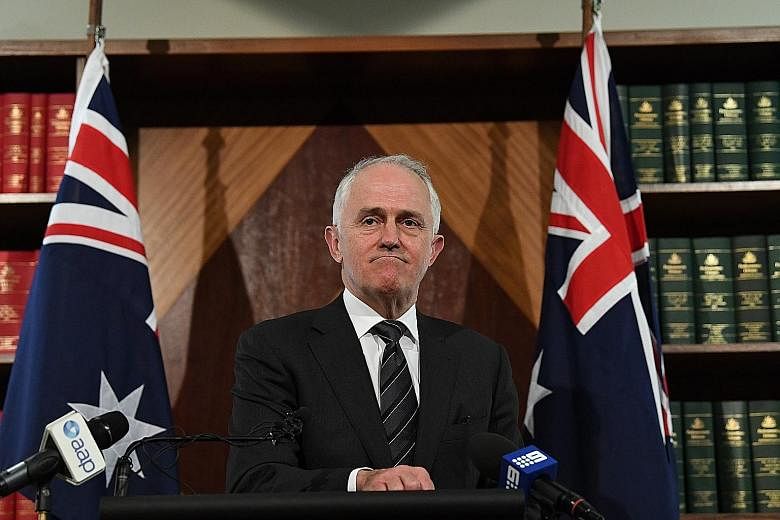In a notably half-hearted defence of his party leader, Australian Liberal MP Kevin Andrews last Friday reaffirmed his political loyalty but proceeded to describe Prime Minister Malcolm Turnbull as the leader "at the moment".
As those three words indicate, Australia's long-running leadership circus is back.
Three Australian prime ministers have been toppled by internal party coups since 2010 - Mr Kevin Rudd, Ms Julia Gillard and Mr Tony Abbott - and Mr Turnbull's future is looking increasingly shaky.
The most immediate threat for Mr Turnbull is the nation's somewhat bizarre dual-citizenship crisis which is slowly eating away at the ruling Liberal-National coalition's razor-thin parliamentary majority.
Following a High Court decision that confirmed that Australia's Constitution strictly bars MPs from being dual citizens, five MPs were disqualified, including former deputy prime minister, Mr Barnaby Joyce.
A sixth legislator - Mr Stephen Parry, the Liberal former president of the Senate - has since resigned after confirming he was a British citizen, and more could soon be on their way.
These include Mr John Alexander, another Liberal who this week revealed he may also be a British citizen via his father. If Mr Alexander is disqualified, the ruling coalition will be left with just 74 seats in the 150-seat Lower House and will be at the mercy of independent MPs. Two other Liberal MPs - of Greek and Hungarian ancestry - are also under potential threat.
Mr Turnbull admitted on Tuesday that further disqualifications of MPs could have "consequences" for the future of his government. This is because Lower House members who are disqualified will be forced to re-contest their seats at by-elections. If any lose, this could cost the coalition its parliamentary majority. "Depending on the result of the by-elections, that could have consequences for the government," he told ABC News.
Mr Turnbull has come under heavy criticism for his handling of the dual-citizenship crisis. For weeks, he resisted calls for an audit to check the citizenship of all MPs, denouncing such a move as a "witch-hunt".
As the pressure grew - and the eligibility of more MPs came under question - he finally announced on Monday a plan to force them to declare that they are not dual citizens and to prove that they have renounced any foreign citizenship.
Political commentators said his turnaround came too late and left him facing the prospect of multiple by-elections in the coming months.
"The citizenship fiasco is an enduring wound which makes it very hard to see how Malcolm Turnbull will find momentum to instigate a political recovery to be competitive at the next election," Dr Peter van Onselen wrote this week in The Australian.
The disappointing result at the 2016 election, when the coalition limped back to power with a tiny majority, has left lasting cracks in Mr Turnbull's leadership.
To retain the support of right-leaning MPs in the coalition, he has distanced himself from previously progressive views on issues such as same-sex marriage and climate change. But this appears to have left him in a political no-man's-land: he has lost the support of many centrist and left-leaning voters but continues to be attacked by right-wing commentators who do not trust his political instincts.
Significantly, when Mr Turnbull explained his move to oust Mr Abbott in 2015, he said that the coalition under his predecessor trailed the opposition Labor party in 30 successive Newspoll surveys. He has now trailed Labor for 22 successive Newspoll surveys, which are taken every two to three weeks.
There are growing murmurings of a party revolt if the Prime Minister cannot improve the coalition's standing in the opinion polls. The two most likely alternative leaders are the Foreign Minister and deputy Liberal leader, Ms Julie Bishop, and the hardline Immigration Minister, Mr Peter Dutton.
Fortunately for Mr Turnbull, most MPs, for now, are not yet following the lead of Mr Andrews.

